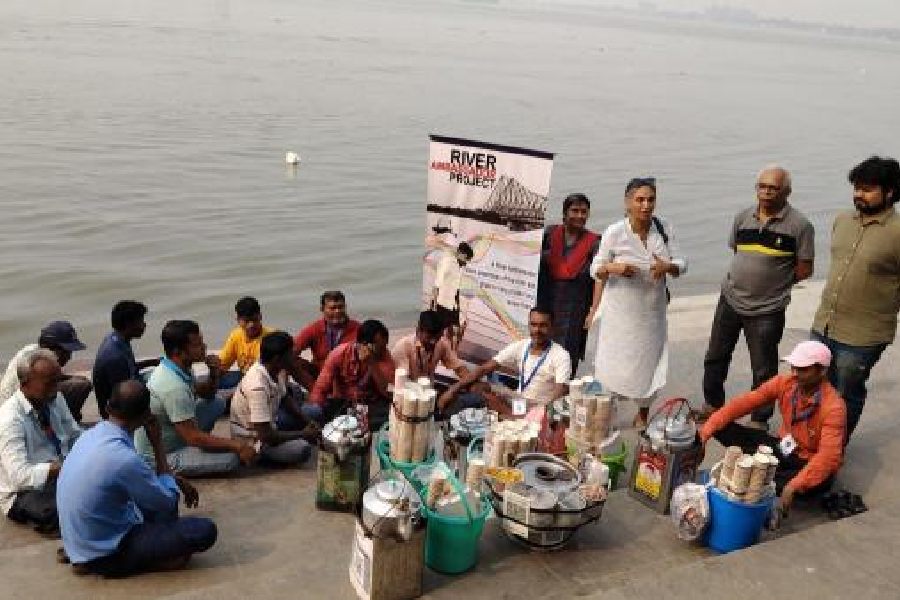“Please do not litter, use the dustbin,” tea seller Pradip Das tells visitors to the Champatala Ghat, near Sovabazar.
Fifty-year-old Das is a “river ambassador”.
Sixteen people, including Das, who earn their livelihood selling tea and snacks or doing odd jobs along the banks of the Hooghly have been trained to keep vigil and prevent visitors from littering the ghats or throwing waste into the river.
The group is also being imparted basic life-saving skills if someone falls into the river.
These men are called “river ambassadors”, highlighting their role in promoting and protecting the river and the ghats.
Kult X — the organisation that has conceptualised the idea of having such trained persons — has pooled together with other groups to impart training to the 16 people and make the “river ambassadors” aware of the importance of the river for the city.
“Their training started on February 3. They were provided ₹100 each hour of training since they had to leave behind their earnings to come and get trained,” said Laily Thompson from Kult X.
Members of Kult X went around the ghats, spoke with the vendors and recruited the 16.
Hundred such people across multiple ghats in the city will be trained for several months.
“The knowledge about the river’s association with the growth of Calcutta and the heritage of the ghats is likely to create greater enthusiasm in the people to do what is expected from them,” said one of the organisers.
The first batch of 16 people who were trained have their businesses in or around Champatala Ghat, between Kumartuli and Ahiritola.
“We have trained them on how to speak to someone littering the ghats without getting angry and having an altercation. How to approach and speak is part of the training,” said Thompson.
Kult X has partnered with the Living Waters Museum and the Sea Explorers’ Institute
for the project.
The Living Waters Museum, an organisation that aims to build “water caring futures” has imparted the training on history and heritage of the ghats, said Thompson.
“They told stories about the ghats and how the river was the route of trade that let Calcutta flourish.”
The Sea Explorers’ Institute, which aims “to attract the youth to our waters”, has imparted training on how to save someone who has fallen into the river by accident and how to resuscitate them.
River ambassador Das, who sells lemon tea walking around the Champatala Ghat, said: “We were taught how to tell people to throw waste in the bins. We have received five bins that are now placed around the ghats.”
One of the five buckets was stolen on February 18 just a week after it was delivered. It reflects the difficulties faced in maintaining good practices in Calcutta’s public spaces.
Thompson added that their objective was to make the ghats bustle with people in the evenings.
After sunset, some of the ghats turn into hubs of “anti-social activities” because they are also very poorly lit or have no lights at all.
“We have written to the port authorities to provide better illumination around the Champatala Ghat. I had once taken an evening river cruise on the Hooghly. From the river, one can see how poorly lit some of the ghats are. The ghats should bustle with energy in the evenings,” said Thompson.










